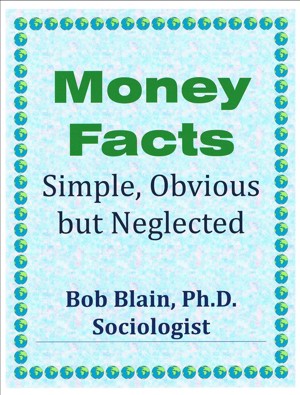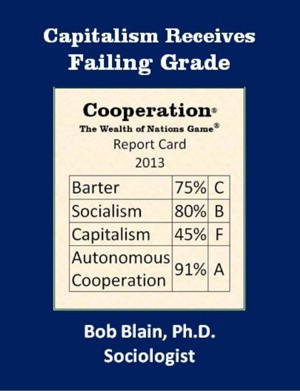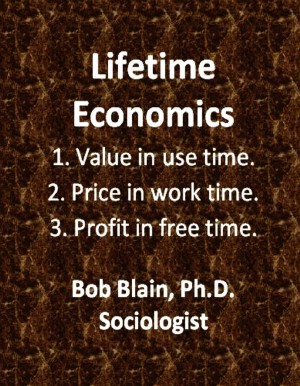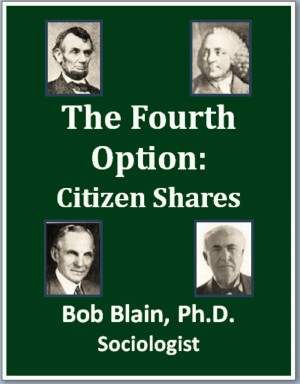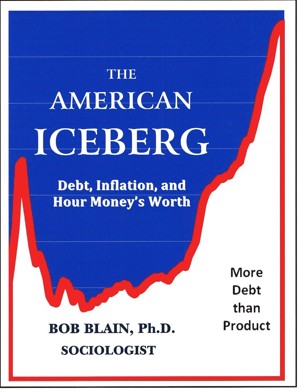
By Bob Blain
Making Money Work Better
Money Facts: Simple, Obvious, but Neglected
by Bob Blain
Series: Making Money Work Better, Book 8.
Price:
Free!
Words: 25,090.
Language:
English.
Published: March 17, 2014
.
Categories:
Nonfiction » Business & Economics » Economics, Nonfiction » Politics & Current Affairs » Democracy
For money to work properly, it needs to be understood as a medium of communication that strangers use to cooperate. Capitalism as we know it is out of control, It can be brought under control by having money originate debt-free with its value defined in work time. Evidence presented from Cooperation:The Wealth of Nations Game shows how it can be done.
Postcard Revolution
by Bob Blain
Series: Making Money Work Better, Book 7.
Price:
Free!
Words: 8,930.
Language:
English.
Published: September 7, 2013
.
Categories:
Nonfiction » History » American, Nonfiction » Politics & Current Affairs » Congress
This is a collection of postcards sent to leaders, including members of Congress, the President, his council of economic advisers, chairs of sociology departments throughout the United States, Canada, and the United Nations. My purpose was to catch their attention with the old fashioned mail method rather than email. I hope you enjoy them and want to read more of my Smashwords books.
Capitalism Receives Failing Grade
by Bob Blain
Series: Making Money Work Better, Book 5.
Price:
Free!
Words: 11,870.
Language:
English.
Published: May 11, 2013
.
Categories:
Nonfiction » Business & Economics » Economics / comparative, Nonfiction » Politics & Current Affairs » Communism & socialism
Simulation of barter, socialism, capitalism, and a system called autonomy with Cooperation: The Wealth of Nations Game played and graded by university students in a sociology class results in a C for barter, a B for socialism, an F for capitalism, and an A for autonomy. The game in computer form is available free, so you can examine and judge each system yourself.
Lifetime Economics
by Bob Blain
Series: Making Money Work Better, Book 4.
Price:
$0.99 USD.
Words: 11,820.
Language:
English.
Published: May 4, 2013
.
Categories:
Nonfiction » Social Science » Sociology, Nonfiction » Business & Economics » Economics
The rules of Lifetime Economics are: 1. Value in use time, 2. Price in work time, and 3. Profit in free time. Economics as we know it today has departed so far from reality that it needs to be replaced. Lifetime economics is intended to do that, bring economics back down to earth. Learn here the meaning of real capital, real debt, real investment, and real Gross Domestic Product.
The Fourth Option: Citizen Shares
by Bob Blain
Series: Making Money Work Better, Book 3.
Price:
$0.99 USD.
Words: 33,780.
Language:
English.
Published: March 13, 2013
.
Categories:
Nonfiction » Politics & Current Affairs » Economic policy, Nonfiction » History » American
The Fourth Option: Citizen Shares proposes that we replace our debt and interest based money supply with one that encourages all of us to share the work and share the wealth that our work produces.
Read in this little book, that many of our greatest leaders, including Benjamin Franklin, Abraham Lincoln, Henry Ford and Thomas Edison, believed that government should issue, not borrow, money.
The Most Wealth: For the Least Work Through Cooperation
by Bob Blain
Series: Making Money Work Better, Book 2.
Price:
$0.99 USD.
Words: 39,950.
Language:
English.
Published: April 11, 2012
.
Categories:
Nonfiction » Politics & Current Affairs » Government, Nonfiction » Politics & Current Affairs » Labor rights
The Most Wealth explains how we can achieve full employment and genuine social security with more free time to realize our natural destiny on earth, well-being and free time to enjoy ife. The key is understanding money as a medium of communication that exists to insure that we all share the work and share the wealth.
The American Iceberg: Debt, Inflation and Money
by Bob Blain
Series: Making Money Work Better, Book 1.
Price:
Free!
Words: 51,610.
Language:
English.
Published: March 27, 2012
.
Categories:
Nonfiction » History » American, Nonfiction » Social Science » Sociology
United States total debt, public and private, not just Federal debt, grew from $82 billion in 1916 to $70 trillion in 2010, almost a thousand times bigger. The cause is traced back to decisions made in 1787 and 1790 by framers of the Constitution and members of the First Congress. The remedy is to now correct their mistakes by properly funding the U.S. economy with "dollar" properly defined.

